#national democratic revolution
Text
instagram
#CPP#CPPh#NPA#the philippines#maoism#communism#revolution#marxism#revolutionary#marxism leninism maoism#communist#maoist#mlm#socialism#natdem#national democratic revolution#Instagram
19 notes
·
View notes
Text
Don't forget the reason the U.S. is supporting Israel's genocide of Palestine - hell, 90% of the reason they ever get involved into something in the Middle East is for ulterior purposes regarding oil.
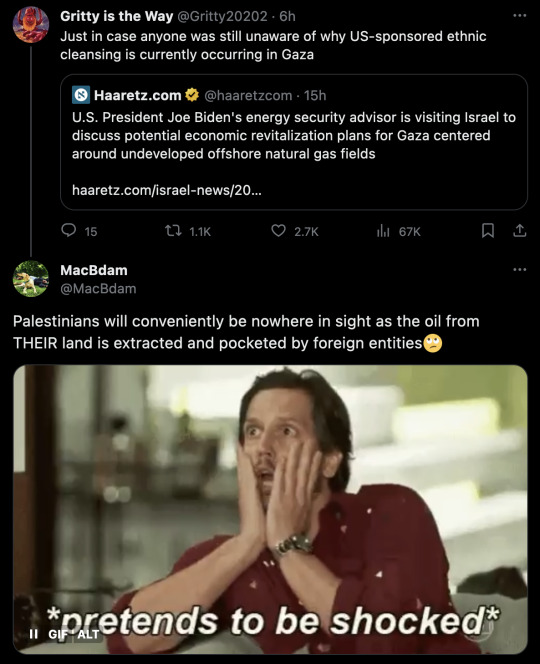
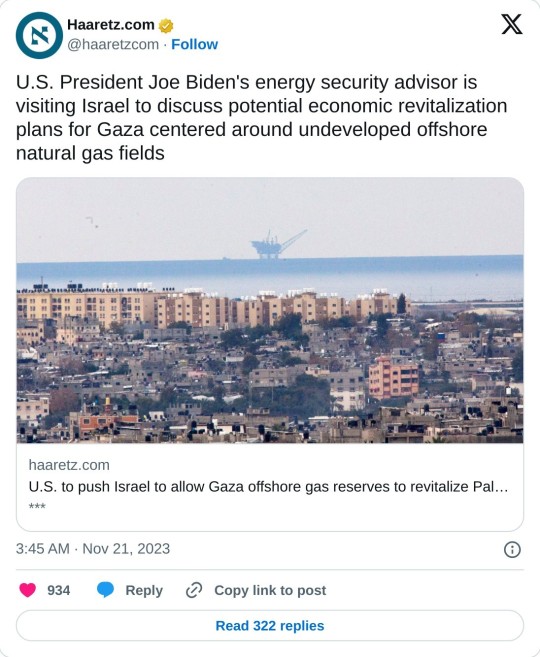
That and the Ben Gurion Canal project, which you can learn more about:
Also this short video explaining the canal's significance and full history in summary:
Simply put,
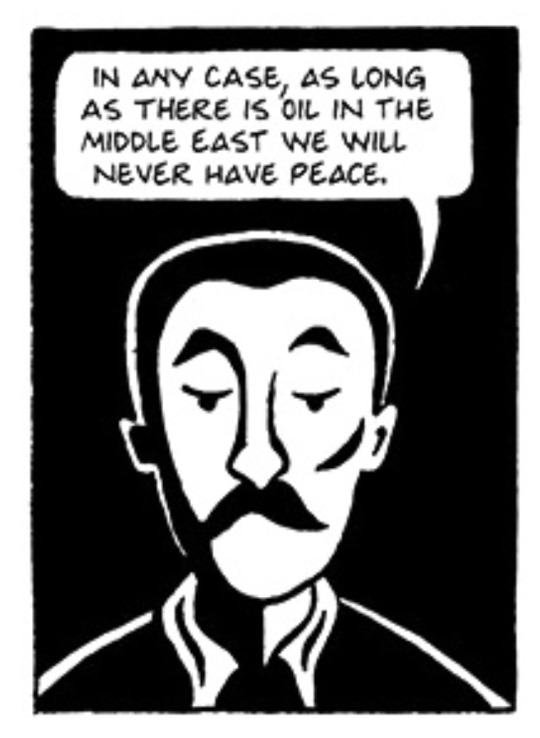
#free palestine#israel is a genocidal state#israel is a terrorist state#fuck america#fuck israel#comic pic is from persepolis btw#which is an autobiography of the author growing up in iran during the iranian revolution#not to mention how the US destabilized iran bc their democratically elected leader was gonna nationalize its oil for iran#and they put someone who would play ball for them in charge#its always about the oil#EVEN IN THE MIDST OF EVERYONE GOING “THE FUTURE ISNT VIABLE W FOSSIL FUELS”#WE SHOULD BE LOOKING FORWARD FOR USING AND TRANSITIONING TO RENEWABLE ENERGY SOURCES#BUT THE CAPITALISTIC FUCKS WANT MONEY NOW#AT THE EXPENSE OF HUMAN LIVES#THE LIVES OF ARABS AND BROWN PPL INDIGENOUS TO PALESTINE NOTE THAT#aaaaaaand of course the canal#much easier than dealing w egypt#for both israel and america#israel will be onboard w them and they'll have a way of strengthening their grip on the middle east and world economy#this is honestly disgusting and terrifying#egypt#suez canal
62 notes
·
View notes
Text
tennessee is arming teachers because of the crisis of school shootings.
an overwhelming majority of firearms used in school shootings have clearly been documented to be obtained completely legally, though.
we’re giving guns to the victims of the people we’ve given guns to.
america has more shame on its face than blood on its hands, abso fucking lutely insane. the united states of america is killing itself stuck in the delusion of its nonexistent “freedom”.
it’s not fucking freedom to constantly be waiting under the possibility of a massacre your country permits.
#leftism#gun control#end gun violence#national suicide#america#fuck republicans#fuck democrats#fuck this fucking country#socialism#socialist revolution#delusional#gun violence#fuck america#fuck the government#disgusting#dystopian#FUCKING SICK#fuck conservatives#fuck the mainstream#save our people you sickos#DON’T ARM THEM#american politics are a one party system
4 notes
·
View notes
Text
I’m gonna rant in the tags and then delete this but People on this site are starting once again to put WAY too much faith in the electoral college system
#if you’ve seen that one vote blue no matter who post going around you know#I’m sorry but voting is not going to save or even help us#there is no harm reduction at this point I’d argue even for the most privileged ppl who make these points#the republican and democratic parties are the same just with different colors#I’d argue voting at this point is just security theater#if you wanna vote fine whatever but if I see people repeat the reaction to the 2016 election again#I swear#if you get upset other people didn’t vote without realizing voting rights are being rapidly worn away#we have no national holiday for voting#and plenty people of color/Black people have said basically nothing has changed so why should they bother#if you’re still in the mindset that voting is our best option bc a violent revolution is unrealistic#please pull your head out of it#also no a third party candidate will not save you either they still operate under the same system#find local mutual aid programs#build community with the people around you so you have a higher chance at survival#care for the most vulnerable around you bc they’ll be the first axed no matter who becomes president#it’s already been happening#and for the love of god mask up#tbd
3 notes
·
View notes
Text
The WACL and CAUSA’s Role in the Ruthless Violence of US-Philippines Counterinsurgency

On the role of WACL and CAUSA in the “anti-communist” counterinsurgency tactics used in the Philippines
Excerpts from "Revolutionary Struggle in the Philippines" by Leonard Davis
pg. 16
A broader fact-finding mission, headed by former US Attorney General Ramsey Clark, took place from 20 to 30 May 1987. The group visited the provinces of Davao, Cebu, Negros, and Central Luzon in what was the most thorough investigation of vigilantes under the Aquino administration.
Several recommendations were made to the government of the United States:
-The CIA's role in advising, organizing, arming, financing, or otherwise supporting vigilante violence in the Philippines is nothing less than a massive campaign of murder, deceit, and manipulation attempting to protect narrowly defined US interests in a policy that is doomed to fail! The US Congress should garner all its resources to put an immediate end to this cruel and absolutely unconscionable activity.
-The US government should put an immediate end to all efforts to whip up anti-communist hysteria in the Philippines, whether through the direct distribution of rightist materials, as the US Information Service (USIS) is doing in Cebu, through the activities of "private citizens" such as Causa, or through funding, advising, and providing technical assistance to the Philippine military and vigilante movement.
-The US Congress should cut off all military aid to the Philippines pending an investigation into the use of US military aid and hardware in supporting vigilante violence in the Philippines.
-The US should withdraw its military facilities from the Philippines, which are of questionable strategic necessity and which were used as a reason to back the ruthless Marcos dictatorship, and are currently being used as a rationale for suppressing the freedom of those who support fundamental social and political changes in their own country.
pg. 163:
In this group are found those who supported Marcos to the bitter end, many of whom were agents of or close collaborators with the CIA or the military. They identify the present status quo as an order ordained by God, and all means - including right wing terrorism - are justified in defending the system against threats which are perceived as the work of Satan. The main actors here include Causa International, which is an arm of the Unification Church of the Reverend Moon. This is closely connected with WACL - the organisation referred to in Chapter 1 - with which a retired US general, John Singlaub, is associated.
pg. 164
. . . the ultra-conservatives launch anti-communist campaigns designed to scare people and induce hysteria. This was particularly so when the ceasefire was being proposed in 1986. In March 1987, VicePresident Salvador Laurel addressed the first national convention of Causa International. He said: We must reject communism as an unmitigated evil ... Causa is conducting the convention, to arouse and galvanise the will and determination of all good men to strengthen freedom and democracy so that the country can resist and prevail over the forces of materialism and godlessness that seek to conquer it. In May 1987, an international fact-finding mission, led by former US attorney-general, Ramsey Clarke, reported that it had evidence to prove that there was 'high prob ability of a link between the CIA and vigilante groups'. One of the members, Gerald Horne, linked Causa in the same way, pointing out that Causa leaders have close connections with the Korean Central Intelligence Agency; and that, in South Korea, they own munitions fcetories.
p. 183:
In May 1986, NDF spokesman Antonio Zummel wamed that the Philippines would be tumed into 'an Asian graveyard for American servicemen if the US persisted In meddling in the insurgency'. This was in response to W ACL visits to the Philippines by Singlaub in his efforts to organise anti-communist vigilantes. Since then, nearly 200 CIA agents have slipped into the country, while US special advisors are involved in instructing Philippine troops in counter-insurgency warfare. American combat patrols operate with local police as far as 20 kilometres from the perimeter fence around Clark Air Base in search of NP A guerrillas, with Filipino fears in some quarters that this could trigger a wider conflict in the countryside. Warning of an escalation in US interference in domestic affairs, Senator Neptali Gonzales is reported as saying: 'History teils us that just one encounter between the dissidents will lead to escalation and this might lead to further the polarisation of the people.' In his reference to 'just one encounter', perhaps Gonzales was thinking of the San Juan Bridge incident which started the Philippine-American War in 1899.
There is no doubt that the country will first move further to the right, with or without US support. With US support, the AFP will build up a supply of sophisticated weaponry and techniques and use more 'subtle' ways of repression; without US support, the AFP will immediately move into full-scale crude and brutal terrorising of the people, more on a Chilean model. Either way, a 'second' revolution will eventually take place - whether as a brief civil war in which the US plays little part (because it has acknowledged its need to seek other venues for its bases and has disappeared), or in the manner of another Vietnam. In either case, the next change will not be without bloodshed, perhaps massive bloodshed. While heartened by the Nicaraguan experience, Filipinos do not expect an early resolution of their problems. Most people believe that it will take at least three generations to overcome the legacy of more than 400 years of domination, Spanish and American.
Related links below
Death Squads in the Philippines by Doug Cunningham
Those Spared in Duterte’s “War on Drugs” May Go to Moonie Rehabilitation
Korean ‘moonies’ leave the Philippines (1996)
Right-Wing Vigilantes Spreading in Philippines (1987)
Unification Church, WACL and CAUSA Were Involved In CIA Operations
Moonies Were Brainwashed by The CIA As Soldiers In The Cold War
Missing Pieces of the Story of Sun Myung Moon by Frederick Clarkson
On the Filipina “Migrant Wives”
The Unification Church’s Role in the FBI’s Cointelpro-style Campaign Against CISPES
“The Moonies Target Europe” (1986) - on CAUSA and right-wing Moonie activity in Europe
Korean UC Reverend takes $10,000 from a farmer for finding him a Filipina wife.
Moonies Support Vigilante Violence in the Philippines Around 1986/1987
On the Post-Marcos Unification Church’s Counterinsurgency Work in the Philippines
Cardinal Sin, the Catholic Church, & the Unification Church: Partners in Organized Anti-Communist Violence
Paraguay ‘Archives of Terror’ Yield New Horrors – and links to the Unification Church of Sun Myung Moon
The Unification Church and the KCIA – ‘Privatizing’ covert action: the case of the UC
“Moon’s Law: God Is Phasing Out Democracy”
The CIA’s Secret Global War Against the Left
Sun Myung Moon organization activities in Central & South America
CIA, Moonies Cooperate in Sandinista War (1984)
Covert Operations and the CIA’s Hidden History in the Philippines
Moon’s Vision: A New Pan-Asianism - on Headwing thought, Pan-Asianism, and counterinsurgency
On the Fascist International, and WACL
CounterSpy: Moonies Move on Honduras (1983)
CounterSpy: Moonies - CARP (1981)
The U.S. is complicit in war crimes in the Philippines
US Aid Privatized
On Yamashita’s Gold, Singlaub, and the Events Following Marcos’ Departure
On How the Moonies Take Advantage of Imperialist Crises in Today’s Philippines
The Moons and the Marcoses
Biden courts son of Philippine dictator he once opposed
Harris Visit to Philippines another Example of US Prioritization of Power over Human Rights
On the UC links to intelligence
Private Groups Step Up Aid to ‘Contras’ (1985)
The Rev. Moon, the Unification Church, and the KCIA
#philippines#revolution#philippine revolution#national democratic front#ndfp#john k. singlaub#singlaub#paramilitary#violence#terrorism#wacl#world anti-communist league#anti-communism#the philippines#u.s. imperialism#CIA#anti-imperialism#imperialism#john singlaub#causa#front organizations#front groups#counterinsurgency#afp#armed forces of the philippines
2 notes
·
View notes
Text
Watch "The New Nation in the World | US History to 1865 | Study Hall" on YouTube
youtube
#us history#government#political parties#settler colonialism#indigenous#federalists#democratic republication party#constitution#national bank#alexander Hamilton#george washington#thomas jefferson#james Madison#french revolution#slavery#Youtube
2 notes
·
View notes
Text
one of those masterposts for Sudan 🇸🇩
Disclaimer: I am not Sudanese, and am in no way an expert on the ongoing crisis. Corrections, if any, are welcome.
LAST UPDATED: 26th April 2024 [Please try to reblog the original post as much as possible]
~
So what's going on in Sudan?
Sudan was under the rule of the military dictator Omar Al-Bashir for thirty years. He came to power through a military coup in June 1989. His rule saw extreme economic decline, repression, and conflict. In the December of 2018, a democratic revolution began that eventually overthrew the dictatorship on April 11, 2019, and saw the beginning of a military rule by militant parties SAF (Sudanese Armed Forces) and RSF (Rapid Support Forces). This unrest is, of course, funded by western governments.
On the 15th of April, 2023, fighting broke out in Khartoum between the SAF and RSF. Clashes spread across the nation of Sudan, and the civilian populace is still caught in the middle. According to UN officials, Sudan is in “one of the worst humanitarian nightmares in recent history."
There is an ongoing war in Sudan, and it's getting worse. There is a health crisis along with the humanitarian crisis as well: around 2/3rds of the population do not have access to healthcare services. Around 15-20 millions suffer from hunger. There are 70 non-operational healthcare facilities in conflict zones. Thousands killed, millions displaced, and a dramatic increase in sexual violence and rape cases.
~
Links for Learning Resources:
Hadhreen: Hadhreen started as an initiative by a small group of Sudanese youth in 2015. Since its inception it continued to work in a variety of sectors, most notably Emergency response, health, and in supporting vulnerable groups.
Talk About Sudan: Learn more about what's happening in Sudan and actions you can take. Also has donation links for those who are able.
Keep Eyes On Sudan: A website run by Sudanese diaspora to amplify the calls of the Sudanese people. Has donation links, actions you can take, upcoming protests and events, resources, FAQs, etc.
#SudanSyllabus.docx: An extensive and well-sourced document, providing English language resources about Sudanese history. It's really long and has got lots of links to books, articles, and more. Curated by Razan Idris.
Human Rights Watch
~
Donation Links:
List of verified charities providing humanitiarian assistance in Sudan
Help Sudan Tarada Initiative: The aim is to deliver emergency basic needs, food and medicine. Funds will be transferred directly to local charities and organization who are managing those shelters to make sure that the funds are well received and is spent on the needs specified.
One Million Sustainable Pads Campaign: Fundraiser to help provide women in IDPs camps with reusable pads
Zubeyda Adam and family (Sudan)
Our home bombarded and destroyed
Help my family escape Sudan's war
Save a transperson in african Refugee camp from starvation [Unsure about the legibility of this one since its not from the person themself, but if someone can verify this for me that would be great]
Hope For Sudan
Darfur Women Action
Doctors Without Borders
Fill A Heart: Financial Assistance to Sudanese Hospitals
Hometax: Sudan Relief
Cairo Sudan Aid
Amal For Women
Sudan Solidarity Collective
Sadagaat
UNICEF
~
These are all the links I have so far. Please spread awareness about Sudan! Let me know if there are any links I should add to the post and I will update it.
#lamp.txt#free sudan#eyes on sudan#sudan#keep eyes on sudan#sudan crisis#sudan genocide#hall of fame
3K notes
·
View notes
Text
i had shared what is happening in sudan on a long facebook post last night, but it virtually received almost little to no engagement or shares from the nearly 600 “friends” i have on the site.
this morning, my great-aunt was shot by the soldiers fighting for power, and God forbid, i lose more of my family members before eid this friday.
please read below to understand what is happening and how you can help my country. i hope the tumblr community can show more kindness than the lack of support and advocacy i’ve seen elsewhere.
يا رب اجعل هذا البلد آمناً 🇸🇩
the lack of awareness and advocacy from the African, Arab, and Muslim diaspora and the human rights community has been painful.
while Western media has done little to no coverage of the ongoing conflict in the capital city of my motherland, Sudan, it appears that the rest of the world also partakes in normalizing crimes and violence against SWANA people.
violence and war hurting the SWANA region are NOT ordinary occurrences — no one, regardless of race, creed, ethnicity, religion, and gender, should experience the unprecedented amount of violence that harms my two living grandmothers, aunts and uncles, and baby cousins who live in Khartoum.
your decision to ignore reading or educating and discussing with others about what is likely to be a civil war is complicity in viewing SWANA people as individuals who regularly experience conflict and are undeserving of help.
the silence is damaging, and it is up to us as privileged members of the diaspora (or individuals living in the Western world committed to human rights) to support the people of my country and their dream for a stable, democratically elected government.
what is happening in Sudan is a fight that started on April 15 between two competing forces for power — the Sudanese Army and the Rapid Support Forces (RSF) — neither groups are representative of the needs of our people. The Sudan Army is loyal to the dictator, Omar Al-Bashir, and the RSF is responsible for the genocide in Darfur.
with both power struggles backed by different Arab and Gulf nations, the two parties have been fighting for power for the last few years. While they worked together to try and end the people’s revolution, they lost. however, they are now in a constant power play of who will get to rule the nation.
this all means that war is NOT a reflection of my country — violence does not represent the SWANA people. Sudan is a nation of beautiful culture, strong women, intellectual and influential Islamic scholars, poets, and youth at the front lines of the revolution. we are a people committed to a region of peace for ourselves and the rest of the Ummah.
my family and the rest of Sudan’s innocent civilians are at the most risk, with many currently without drinking water, food to eat, electricity, and complete blockage to any mosques during the final nights of Ramadan, our holiest month of the year.
i ask that you please keep Sudan and our people in your prayers — donate to the Sudan Red Crescent or a mutual aid GoFund Me, email your representatives if you live in a country that can put pressure on either competing force of power, discuss this with your family and friends, and please do not forget to think about SWANA people — our brothers and sisters in Syria, Yemen, Lebanon, and many others need our love and support.
الردة_مستحيلة ✊🏾
#KeepEyesOnSudan
#lama makes a monologue#tw: war#tw: death#tw: violence#tw: gun mention#KeepEyesOnSudan#keep eyes on sudan#sudan coup#SudanCoup#sudan#sudan crisis#SWANA#MENA#north africa#middle east#current events#news#war#violence#long reads#long post#Sudan_Update#sudan update
5K notes
·
View notes
Text
Check out my weekly live streamed show, as seen on the web since 2007, on my Progressive Discussions YouTube channel. Saturday's 8:00 p.m. eastern time. Knowledgeable proactive progressives are welcome to join. www.youtube.com/megalife21
#news nation#the damage report#jesse ventura#the humanist report#democracy now#ralph nader#our revolution#democratic socialists of america#youtube#twitter#tick tock
0 notes
Text
Maoche Legislador | Spokesperson | Negros Island Regional Operational Command (Apolinario Gatmaitan Command) | New People's Army | January 09, 2024
With boastful victory declarations in 2023, the Armed Forces of the Philippines Visayas Command (AFP-VISCOM) inadvertently admits that the Communist Party of the Philippines (CPP), New People’s Army (NPA), and the entire revolutionary movement on Negros Island and the rest of the Visayas remain undefeated.
According to VISCOM’s fake news factory chief, Lt. Gen. Benedict Arevalo, in 2023 they initiated 82 encounters in Central and Western Visayas, but in reality these are mostly fake encounters aimed at justifying their crimes, including the brutal murder of National Democratic Front of the Philippines (NDFP) peace consultant Rogelio Posadas and cold-blooded killings of peasant families. Along with this, Arevalo boasted of clearing communities and dismantling organizations which meant de facto martial law in the countrysides.
However, Arevalo could not hide the truth of the failure of his leadership and tried hard to sugarcoat their frustration by claiming that “there is still much to be done” and that “focused military operations will continue…as long as there are still unresolved issues, the threat of resurgence will remain.”
In fact, the other side of maintaining costly military operations purportedly to quash the NPA is that this is a source of military corruption. The AFP will lose a huge milking cow, not to mention endure utter humiliation, if they declare “total victory” over the NPA.
As the AFP is pressured into becoming cannon fodders for the increasing threat of an inter-imperialist war on Philippine shores, it is to be expected that Arevalo will continue shoving similar hallucinations. And yet, their unspeakable crimes against the people, under superficial terms of “internal security operations” and the like, will continue to wreak state terrorism. Unwittingly, however, this will only make the people’s war persevere. While the socioeconomic crisis continues to worsen day by day, the people will fight. Crisis generates resistance, and oppression fuels the revolution.
#the philippines#NPA#CPP#CPPh#NDF#national democratic revolution#maoism#communism#marxism leninism maoism#revolution#mlm#socialism#maoist#communist#marxism#revolutionary#filipino
14 notes
·
View notes
Text
My Beloved Oppressor - By 서사희 (8.5/10)

Having royal blood is a curse if you have no protection. A death sentence if the people are angry. Our protagonist isn't even a Princess. She is merely the daughter of a Marquis. She is also the only royal left, in a newly democratic nation. Her revolutionary husband is keeping her alive for some reason, even though he hates royal blood.
Annette Rosenberg was a pawn. A blushing bride. A pretty idiot. Her only real hobby and talent is useless. She was never strong academically. She was the perfect noble wife. Pretty, useless, and skilled at making pretty noises on the piano.

It was not her fault. She didn't know the men in power had pushed the people too far. She didn't know a revolution was brewing. Heiner Valdemar courted her and married her to spy on her father. Nothing more, nothing less. Now she is the last royal in the country, and people cry for her blood every single day.

Heiner Valdemar supported all of the death. He made the country better for the people, and he sacrificed her family to do it. He tells his stupid princess the truth. Her beloved father had child slaves. Child slave assassins and soldiers who died often. He was one of the only survivors, and he only survived because he was useful. A genius with a strong body.
His friends were fodder.
He did get revenge for them, and yet Annette Rosenberg is still alive.

He was a great actor too.
Annette Rosenberg truly loved him.
When the royals began to die out she trusted him wholly. She only, finally noticed his true loyalty when his love faded away. Yes, the second he stopped spoiling her. When he stopped drowning her in love she did two seconds of research.
She didn't randomly meet her husband.
He carefully planned their love and marriage in advance.

He's convincingly cruel.
He really is, but there's one problem.
She's not dead.

Everybody wants him to divorce her as well. Annette Rosenberg even asks for a divorce, right after the truth comes out. Anneli is another revolutionary. An inspiring political figure for the people. Annette Rosenberg is well aware that Anneli doesn't like her, but Anneli also doesn't love Heiner.
It's all politics.
She's tired.

She's tired of being afraid. Being the last royal makes her suspicious. Everybody thinks she's using blood money or spare child soldiers to stay alive.
The screwed up part is they're actually right. Heiner, a former child soldier, is protecting her as if she is his master. Not his wife. He doesn't even go near her most days, but he is personally in charge of her fragile security situation.

Other young nobles managed to escape tp foreign countries. A friend comes to pick Annette Rosenberg up, but Heiner won't even let her go then. This offer of freedom is a tipping point.
We see why she's not dead.
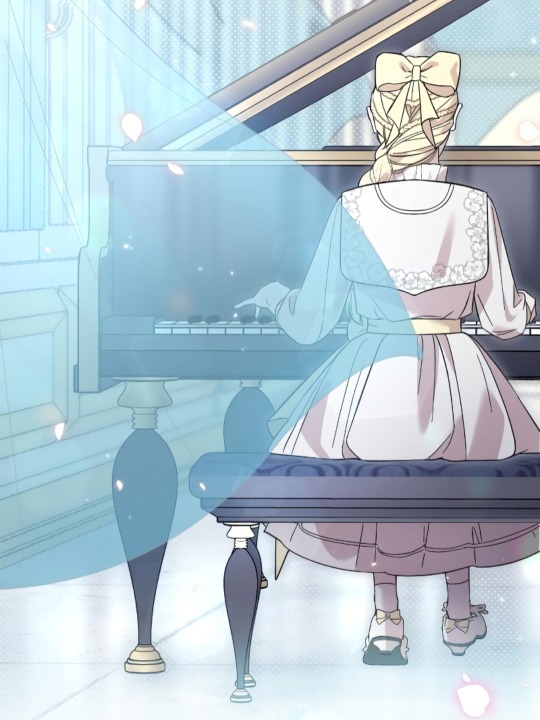
Little Annette Rosenberg was very cute. She played on her special pink piano with her special teachers, in her special dresses. She laughed in her ribbons, and she ran through the hallways.
She had an admirer.
Heiner Valdemar used to spy on her, in between deadly child soldier missions.

He wants to believe he's punishing her.
He wants to believe that torturing her with loneliness is his goal, but she's been his only love his entire life.
To him, the romantic part of marriage doesn't matter. Being her husband and fake lover was such a strange and twisted reward, after years of observation.
He doesn't want to let her go.
418 notes
·
View notes
Note
how do ml's reconcile with lenin going for a bigbrainhaver hierarchy which just so happened to place him at the tippy top? most of the things he's quoted for writing make a kind of sense in that longwinded academic philosopher way, but, like, russia went from having a revolution against monarchy to having a monarchy, essentially, and what folks do tends to align with their desires, yeah? wouldn't that make everything he said, idk, suspicious?
we reconcile with this because none of this is even remotely true. lenin did not 'happen to be placed at the tippy top' but was in fact elected by the soviets, who worked in a very simple electoral system by which workers and peasants would elect representatives to their local soviet, who as well as administering local services would also elect members to higher bodies. the quote unquote bigbrainhaver hierarchy system in question was as follows:
The sovereign body is in every case the Congress of Soviets. Each county sends its delegates. These are elected indirectly by the town and county Soviets which vote in proportion to population, following the ratio observed throughout, by which the voters in the town have five times the voting strength of the inhabitants of the villages, an advantage which may, as we saw, be in reality three to one.
The Congress meets, as a rule, once a year, for about ten days. It is not, in the real sense of the word, the legislative body. It debates policy broadly, and passes resolutions which lay down the general principles to be followed in legislation. The atmosphere of its sittings is that of a great public demonstration. The Union Congress, for example, which has some fifteen hundred members, meets in the Moscow Opera House. The stage is occupied by the leaders and the heads of the administration, and speeches are apt to be big oratorical efforts.
The real legislative body is the so-called Central Executive Committee (known as the C. I. K. and pronounced "tseek") . It meets more frequently than the Congress to which it is responsible-in the case of the Union, at least three times in the year-passes the Budget, receives the reports of the Commissars (ministers), and discusses international policy. It, in its turn, elects two standing bodies:
(1) The Presidium of twenty-one members, which has the right to legislate in the intervals between the sittings of the superior assemblies, and also transacts some administrative work.
(2) The Council of Peoples' Commissars. These correspond roughly to the Ministers or Secretaries of State in democratic countries and are the chiefs of the administration. Meeting as a Council, they have larger powers than any Cabinet, for they may pass emergency legislation and issue decrees which have all the force of legislation. Save in cases of urgency, however, their decrees and drafts of legislation must be ratified by the Executive Committee (C.I.K.). In another respect they differ from the European conception of a Minister. Each Commissar is in reality the chairman of a small board of colleagues, who are his advisers. These advisory boards, or collegia, meet very frequently (it may even be daily) to discuss current business, and any member of a board has the right to appeal to the whole Council of Commissars against a decision of the Commissar.
—H.N. Brailsford, How The Soviets Work (1927)
you might notice that the congresses of soviets were not directly elected -- this is because they were elected by local soviets, who were directly elected, in a process that many people have given first hand accounts of:
I have, while working in the Soviet Union, participated in an election. I, too, had a right to vote, as I was a working member of the community, and nationality and citizenship are no bar to electoral rights. The procedure was extremely simple. A general meeting of all the workers in our organisation was called by the trade union committee, candidates were discussed, and a vote was taken by show of hands. Anybody present had the right to propose a candidate, and the one who was elected was not personally a member of the Party. In considering the claims of the candidates their past activities were discussed, they themselves had to answer questions as to their qualifications, anybody could express an opinion, for or against them, and the basis of all the discussion was: What justification had the candidates to represent their comrades on the local Soviet.
As far as the elections in the villages were concerned, these took place at open village meetings, all peasants of voting age, other than those who employed labour, having the right to vote and to stand for election. As in the towns, any organisation or individual could put forward candidates, anyone could ask the candidate questions, and anybody could support or oppose the candidature. It is usual for the Communist Party to put forward a candidate, trade unions and other organisations can also do so, and there is nothing to prevent the Party’s candidate from not being elected, if he has not sufficient prestige among the voters.
In the towns the “ electoral district ” has hitherto consisted of a factory, or a group of small factories sufficient to form a constituency. But there was one section of the town population which has always had to vote geographically, since they did not work together in one organisation. This was the housewives. As a result, the housewives met separately in each district, had their own constituencies, and elected their own representatives to the Soviet. Here, too, vital interest has always been shown in the personality of every candidate. Why should this woman be elected ? What right had she to represent her fellow housewives on the local Soviet ? In the district next to my own at the last election the housewife who was elected was well known as an organiser of a communal dining-room in the district. This was the kind of person that the housewives wanted to represent them on the Soviet. Another candidate, a Communist, proposed by the local organisation of the Party, was turned down in her favour.
[...]
The election of delegates to the local Soviet is not the only function of voters in the Soviet Union. It is not a question here of various parties presenting candidates to the electorate, each with his own policy to offer. The Soviet electorate has to select a personality from its midst to represent it, and instruct this person in the policy which is to be followed when elected. At a Soviet election meeting, therefore, as much or more time may be spent on discussion of the instructions to the delegate as is spent on discussing the personality of the candidates.
At the last election to the Soviets, in which I personally participated, we must have spent three or four times as much time on the working out of instructions as we did on the selection of our candidate. About three weeks before the election was to take place the trade union secretary in every department of our organisation was told by the committee that it was time to start to prepare our instructions to the delegate. Every worker was asked to make suggestions concerning policy which he felt should be brought to the notice of the new personnel of the Moscow Soviet.
As a result, about forty proposals concerning the general government of Moscow were handed in from a group of about twenty people. We then held a meeting in our department at which we discussed the proposals, and adopted some and rejected others. We then handed our list of pro¬ posals to a commission, appointed by the trade union committee, and representing all the workers in our organisation. This Commission co-ordinated the pro¬ posals received, placed them in order according to the various departments of the Soviet, and this co-ordinated list was read at the election meeting itself, again discussed, and adopted in its final form.
—Pat Sloan, Soviet Democracy (1937)
Between the elections of 1931 and 1934, no less than 18 per cent of the city deputies and 37 per cent of village deputies were recalled, of whom only a relatively small number — 4 per cent of the total — were charged with serious abuse of power. The chief reasons for recall were inactivity — 37 per cent — and inefficiency — 21 per cent. If these figures indicate certain lacks in the quality of elected officials, they show considerable activity of the people in improving government.
The electorate of the Peasants' Gazette, for example, consisted of some 1,500 employees, entitled to elect one deputy to the Moscow city soviet and two to the ward soviet. For more than a month before the election every department of the newspaper held meetings discussing both candidates and instructions. Forty-three suggested candidates and some 1,400 proposals for the work of the incoming government resulted from these meetings, which also elected committees to boil down and classify the instructions. These committees issued a special four-page newspaper for the 1,500 voters; it contained brief biographies of the forty-three candidates, an analysis of their capacities by the Communist Party organization of the Peasants' Gazette, and the "nakaz," or list of "people's instructions," classified by subject and the branch of government which they concerned. At the final election meeting of the Peasants* Gazette there was literally more than 100 per cent attendance, since some of the staff who for reasons of absence or illness had not been listed as prospective voters returned from sanatoria or from distant assignments to vote. The instructions issued by the electorate in this manner — 1,400 from the Peasants' Gazette and tens of thousands from Moscow citizens — became the first business of the incoming government.
—Anna Louise Strong, The New Soviet Constitution (1937)
does this mean that the soviet project was some utopian perfect system? no. there were flaws in the system like any other. it disenfranchised the rural peasantry (although not, i would like to add, to any extent greater or even equivalent to the extent to which the US electoral system disenfranchises the urban working class) -- the various tiers of indirect selection created a divide between the average worker and the highest tier of the executive -- and various elements of this fledgling system would calcify and bureaucratise over time in ways that obstructed worker's democracy. but saying that it was 'a monarchy' is founded in absolutely nothing except the most hysterical anticommunist propaganda and tedious orwellian liberal truisms.
even brailsford, in an account overall critical of the soviet system, had to admit:
Speaking broadly, the various organs of the system, from the Council of Commissars of the Union down to the sub-committees of a town Soviet, are handling the same problems. Whether one sits in the Kremlin at a meeting of the most august body of the whole Union, the "C.I.K.," or round a table in Vladimir with the working men who constitute its County Executive Committee, one hears exactly the same problems discussed. How, be-fore June arrives, shall we manage to reduce prices by ten percent? What growth can we show in the number of our spindles, or factories, and in the number of workers employed? When and how shall we make our final assault on the last relics of illiteracy? Or when shall we have room in our schools, even in the remotest village, for every child? Was it by good luck or good guidance that the number of typhus cases has dropped in a year by half? And, finally, how can we hasten the raising of clover seed, so that the peasants who, at last, thanks to our propaganda, are clamoring for it, may not be disappointed?
—H.N. Brailsford, How The Soviets Work (1927)
genuinely, i think you should take a moment and think about where you learned about the soviet union. have you read any serious historical work on the topic, even from non-communist or anti-communist sources? because even imperialist propagandists have to make a pretence at engaging with actual facts on the ground, something which you haven't done at all -- and yet you speak with astounding confidence. i recommend you read some serious books instead of animal farm and reflect on why you believe the things you believe and how you know the things you think you know.
1K notes
·
View notes
Video
youtube
The Silent Revolution in American Economics
I don't think you're expecting what I'm about to say, because I have never seen anything like this in fifty years in politics.
For decades I've been sounding an alarm about how our economy has become increasingly rigged for the rich. I've watched it get worse under both Republicans and Democrats, but what President Biden has done in his first term gives me hope I haven't felt in years. It’s a complete sea change.
Here are three key areas where Biden is fundamentally reshaping our economy to make it better for working people.
#1 Trade and industrial policy
Biden is breaking with decades of reliance on free-trade deals and free-market philosophies. He’s instead focusing on domestic policies designed to revive American manufacturing and fortify our own supply chains.
Take three of his signature pieces of legislation so far — the Inflation Reduction Act, the CHIPS Act, and his infrastructure package. This flood of government investment has brought about a new wave in American manufacturing.
Unlike Trump, who just levied tariffs on Chinese imports and used it as a campaign slogan, Biden is actually investing in America’s manufacturing capacity so we don’t have to rely on China in the first place.
He’s turning the tide against deals made by previous administrations, both Democratic and Republican, that helped Wall Street but ended up costing American jobs and lowering American wages.
#2 Monopoly power
Biden is the first president in living memory to take on big monopolies.
Giant firms have come to dominate almost every industry. Four beef packers now control over 80 percent of the market, domestic air travel is dominated by four airlines, and most Americans have no real choice of internet providers.
In a monopolized economy, corporate profits rise, consumers pay higher prices, and workers’ wages shrink.
But under the Biden, the Federal Trade Commission and the Antitrust Division of the Justice Department have become the most aggressive monopoly fighters in more than a half century. They’re going after Amazon and Google, Ticketmaster and Live Nation, JetBlue and Spirit, and a wide range of other giant corporations.
#3 Labor
Biden is also the most pro-union president I’ve ever seen.
A big reason for the surge in workers organizing and striking for higher wages is the pro-labor course Biden is charting.
The Reagan years blew in a typhoon of union busting across America. Corporations routinely sunk unions and fired workers who attempted to form them. They offshored production or moved to so-called “right-to-work” states that enacted laws making it hard to form unions.
Even though Democratic presidents promised labor law reforms that would strengthen unions, they didn’t follow through. But under Joe Biden, organized labor has received a vital lifeboat. Unionizing has been protected and encouraged. Biden is even the first sitting president to walk a picket line.
Biden’s National Labor Relations Board is stemming the tide of unfair labor practices, requiring companies to bargain with their employees, speeding the period between union petitions and elections, and making it harder to fire workers for organizing.
Americans have every reason to be outraged at how decades of policies that prioritized corporations over people have thrown our economy off-keel.
But these three waves of change — a worker-centered trade and industrial policy, strong anti-monopoly enforcement, and moves to strengthen labor unions — are navigating towards a more equitable economy.
It’s a sea change that’s long overdue.
433 notes
·
View notes
Note
Why aren't you a revolutionary?
I live in the US, and there won't be a left-wing revolution here any time soon. There are no vanguard parties, no radicalized masses, no crisis of legitimacy for the current government, no infiltrated armed forces, no unifying figures. Conditions here could radically change, but for the next couple decades at least, talking about leftist revolution in the US is a little like basing your politics around the immediate formation of a world government or the complete abolition of nation states.
As an extension of the previous, if you live in a somewhat-functional democracy like the US, it seems a lot easier to just... win an election. There are certainly barriers to leftists winning elections beyond unpopularity, but there are a hell of a lot more barriers to winning a revolution. It's a lie to pretend the playing field is equal under liberal democracy, but it's delusional to think that the playing field for armed struggle isn't massively more unequal.
I think I would be kinda sympathetic (though still not convinced of anything, see 1 and 2) if the logic of most US leftist revolutionaries was something along the lines of "the US has rotten, stagnant institutions that limit the ability of truly democratic sentiment to express itself and wield power, and I want to clear away the cruft" but instead it's typically something along the lines of "well I would like to do the cultural revolution here but I can't do that no matter how many elections I win." It would help the case of revolutionaries if they were not apologists for the worst excesses of prior revolutions.
#tl;dr i think revolutionary politics are a dead end in the US and i don't particularly like the last few adherents#politics#discourse
391 notes
·
View notes
Link
Extol all heroes and martyrs of the Philippine revolution
Marco Valbuena | Chief Information Officer | Communist Party of the Philippines
April 17, 2023
The Communist Party of the Philippines (CPP) and the New People’s Army (NPA) joins the National Democratic Front of the Philippines (NDFP) in holding the Week to Remember and Honor the Filipino People’s Heroes and Martyrs on April 17 to 24, which the NDFP National Council declared as an annual event.
During this week, let us remember all the heroes and martyrs of the Philippine revolution in the more than five decades of revolutionary resistance to achieve national freedom and democracy.
On this occasion, we give our highest tribute to CPP Central Committee founding chairperson Ka Jose Maria Sison (Amado Guerrero) who dedicated close to six decades of his life to the Filipino people’s patriotic and democratic cause. His revolutionary spirit is immortal and will forever inspire the next generation of Filipino revolutionaries.
The Party pays tribute to all the heroes and martyrs of the people, including members of the Central Committee, its Political Bureau and Executive Committee, as well as cadres, Red fighters and mass activists, who paid the ultimate sacrifice or died while serving the people and fighting for the national democratic cause.
The Filipino people’s martyrs are the indestructible bastions of the national-democratic revolution. They have shown indomitable resolve to struggle with the Filipino masses against imperialism, feudalism and bureaucrat-capitalism. To them we give our highest reverence and salute!
At the same time, we extol the revolutionary masses, the activists of mass organizations, Red fighters, organizers and cadres of the Party who continue to persevere along the revolutionary path despite all the hardships and sacrifices especially in the face of heightened campaign of fascist terrorism instigated by US imperialism.
The CPP call on all its committees, revolutionary mass organizations and units of the NPA to mount activities in the upcoming days to mark this week of remembrance. Memorial meetings and assemblies can be held in secret where tributes and remembrance of our heroes can be read.
The sacrifice of our heroes has paid in the form of the revolutionary power attained and established across the entire country. This power emanates from the people. It has taken deep and wide roots and continues to expand. It will never be vanquished even in the face of the enemy’s relentless military campaigns of suppression. This power is the future of the Filipino people.
The Party calls on the Filipino people to continue their valiant resistance to the enemy’s reign of terror, and fight to win justice for all victims of fascist terrorism.
Our heroes and martyrs have paved the path towards the country’s bright future. Still, the road towards ultimate victory remains long and difficult. Imbued with their spirit, the Filipino people will continue to endure and carry forward.
Long live the Filipino people’s heroes and martyrs!
Related articles below
Tatay Pops is a victim of Aquino regime’s Oplan Bayanihan (2011)
Thoughts on Dying for the People
The AFP and PNP are Moonie-Backed Terrorist Forces; Teachers and Activists Murdered by Moonie Weapons
The Death of Jose Maria Sison (Joma)
The UC should be held responsible for supplying weapons that killed young Filipino activists
In praising Shinzo Abe, Marcos and Duterte insult the collective memory of the Filipino people
Video: The New People's Army of the Philippines
Right-Wing Vigilantes Spreading in Philippines (1987)
On the CIA’s Long History of “Black Propaganda” in the Philippines
#communist party of the philippines#philippines#the philippines#capitalism#imperialism#anti-imperialism#anti-capitalism#communism#revolution#feudalism#jose maria sison#cpp#ndfp#national democratic front#socialism
0 notes
Text
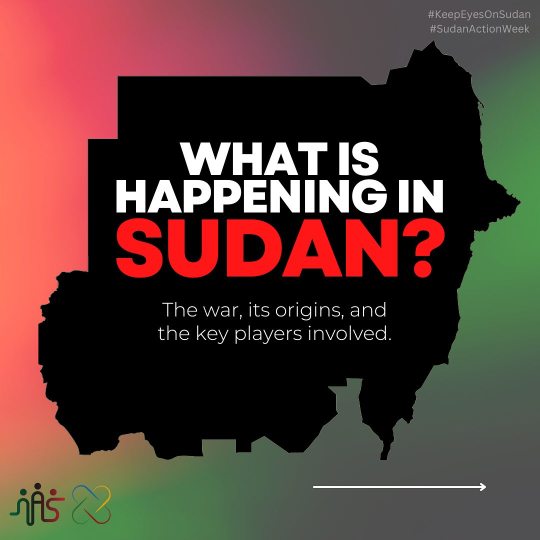
Via NasAlSudan
December 17 2023. #KeepEyesOnSudan #SudanActionWeek
Swipe through to build a foundational understanding of the war, its origins, and the key players involved. For actionable ways to support those in Sudan, check the link in our bio. Stay tuned for more posts this week.
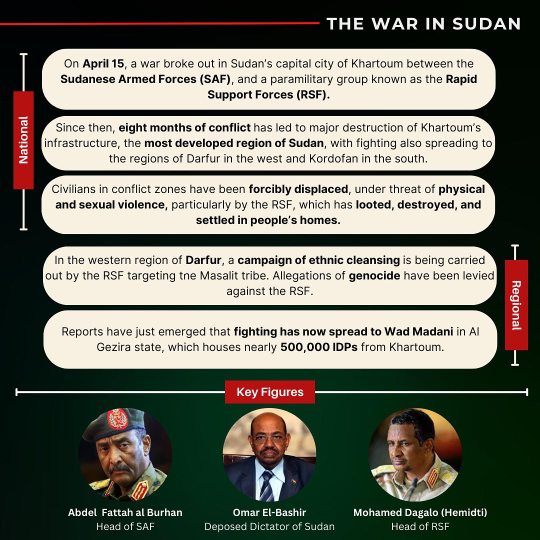
Transcript:
National:
On April 15, a war broke out in Sudan's capital city of Khartoum between the Sudanese Armed Forces (SAF), and a paramilitary group known as the Rapid Support Forces (RSF).
Since then, eight months of conflict has led to major destruction of Khartoum's infrastructure, the most developed region of Sudan, with fighting also spreading to the regions of Darfur in the west and Kordofan in the south.
Civilians in conflict zones have been forcibly displaced, under threat of physical and sexual violence, particularly by the RSF, which has looted, destroyed, and settled in people's homes.
Regional:
In the western region of Darfur, a campaign of ethnic cleansing is being carried out by the RSF targeting the Masalit tribe. Allegations of genocide have been levied against the RSF.
Reports have just emerged that fighting has now spread to Wad Madani in Al Gezira state, which houses nearly 500,000 IDPs from Khartoum.
Key figures:
Abdel Fattah al Burhan Head of SAF
Omar El-Bashir Deposed Dictator of Sudan
Mohamed Dagalo (Hemidti) Head of RSF
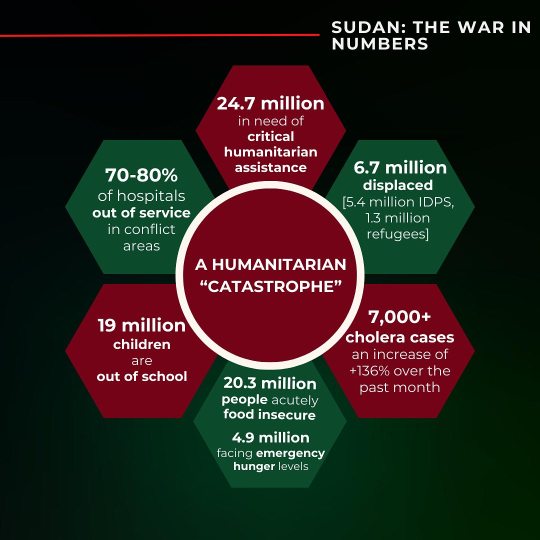
Transcript:
Sudan: the war in numbers
A humanitarian "catastrophe"
24.7 million in need of critical humanitarian assistance
70-80% of hospitals out of service in conflict areas
19 million children are out of school
20.3 million people acutely food insecure. 4.9 million facing emergency hunger levels
6.7 million displaced [5.4 million IDPS, 1.3 million refugees]
7,000+ cholera cases an increase of +136% over the past month
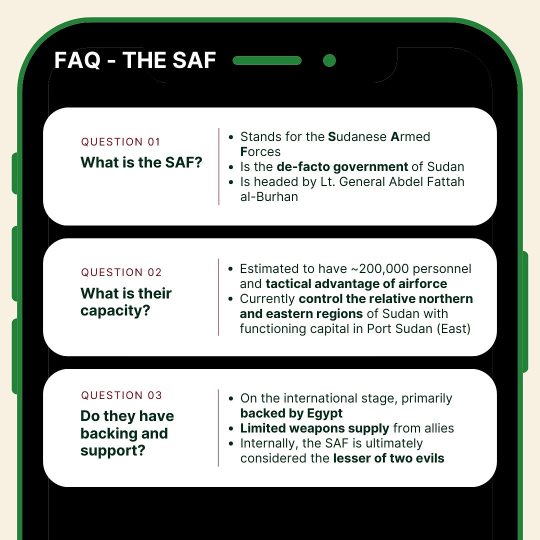
Transcript:
FAQ - THE SAF
QUESTION 01: What is the SAF?
Stands for the Sudanese Armed Forces
Is the de-facto government of Sudan
Is headed by Lt. General Abdel Fattah al-Burhan
QUESTION 02 What is their capacity?
Estimated to have ~200,000 personnel and tactical advantage of airforce
Currently control the relative northern and eastern regions of Sudan with functioning capital in Port Sudan (East)
QUESTION 03 Do they have backing and support?
On the international stage, primarily backed by Egypt
Limited weapons supply from allies
Internally, the SAF is ultimately considered the lesser of two evils
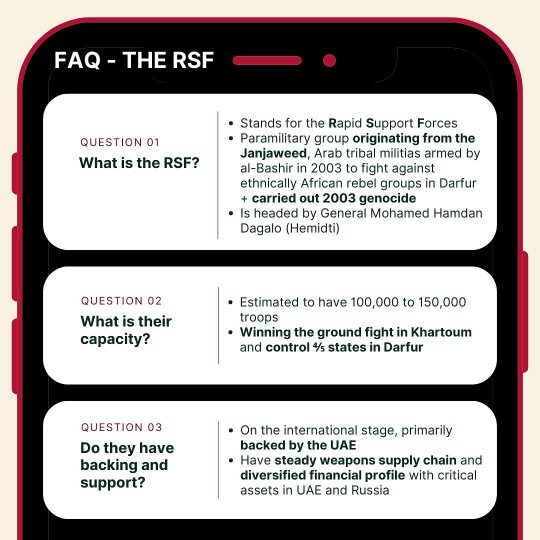
Transcript:
FAQ - THE RSF
QUESTION 01 What is the RSF?
Stands for the Rapid Support Forces
Paramilitary group originating from the Janjaweed, Arab tribal militias armed by al-Bashir in 2003 to fight against ethnically African rebel groups in Darfur + carried out 2003 genocide
Is headed by General Mohamed Hamdan Dagalo (Hemidti)
QUESTION 02 What is their capacity?
Estimated to have 100,000 to 150,000 troops
Winning the ground fight in Khartoum and control 4/5 states in Darfur
QUESTION 03 Do they have backing and support?
On the international stage, primarily backed by the UAE
Have steady weapons supply chain and diversified financial profile with critical assets in UAE and Russia
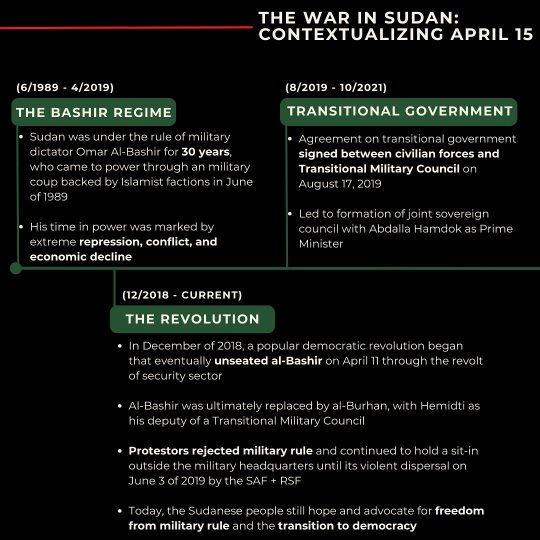
Transcript:
THE WAR IN SUDAN: CONTEXTUALIZING APRIL 15
(6/1989 - 4/2019) THE BASHIR REGIME
Sudan was under the rule of military dictator Omar Al-Bashir for 30 years, who came to power through an military coup backed by Islamist factions in June of 1989
His time in power was marked by extreme repression, conflict, and economic decline
(12/2018 CURRENT) THE REVOLUTION
In December of 2018, a popular democratic revolution began that eventually unseated al-Bashir on April 11 through the revolt of security sector
Al-Bashir was ultimately replaced by al-Burhan, with Hemidti as his deputy of a Transitional Military Council
Protestors rejected military rule and continued to hold a sit-in outside the military headquarters until its violent dispersal on June 3 of 2019 by the SAF + RSF
Today, the Sudanese people still hope and advocate for freedom from military rule and the transition to democracy
(8/2019-10/2021) TRANSITIONAL GOVERNMENT
Agreement on transitional government signed between civilian forces and Transitional Military Council on August 17, 2019
Led to formation of joint sovereign council with Abdalla Hamdok as Prime Minister
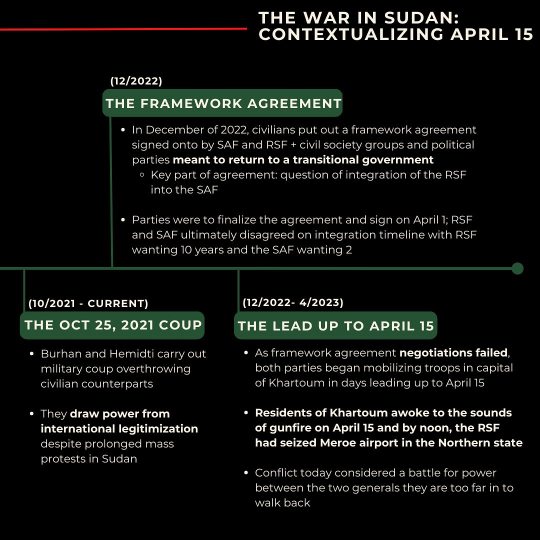
Transcript:
(10/2021 CURRENT)THE OCT 25, 2021 COUP
Burhan and Hemidti carry out military coup overthrowing civilian counterparts
They draw power from international legitimization despite prolonged mass protests in Sudan
(12/2022) THE FRAMEWORK AGREEMENT
In December of 2022, civilians put out a framework agreement signed onto by SAF and RSF + civil society groups and political parties meant to return to a transitional government
Key part of agreement: question of integration of the RSF into the SAF
Parties were to finalize the agreement and sign on April 1; RSF and SAF ultimately disagreed on integration timeline with RSF wanting 10 years and the SAF wanting 2
(12/2022-4/2023) THE LEAD UP TO APRIL 15
As framework agreement negotiations failed, both parties began mobilizing troops in capital of Khartoum in days leading up to April 15
Residents of Khartoum awoke to the sounds of gunfire on April 15 and by noon, the RSF had seized Meroe airport in the Northern state
Conflict today considered a battle for power between the two generals they are too far in to walk back

Transcript:
FRAMING ALLIANCES
Sudanese Armed Forces (SAF):
Egypt
Israel (Foreign Ministry)
Islamists
Iran
Saudi Arabia
Ukraine (SOF)
Armed Groups
Rebel groups that had taken up arms against the central government in the Bashir Era are forced to ally with the SAF due to the RSF's ethnic cleansing campaign. They include:
Justice and Equality Movement (Gibril Ibrahim)
Sudan Liberation Movement/Army (Minni Minawi)
Gathering of Sudan Liberation Forces (Abdallah Yahya)
Rapid Support Forces (RSF):
Israel (Mossad)
Libya (Khalifa Haftar)
United Arab Emirates
Central African Republic
Russia (Wagner Group)
Chad
Arab Tribal Leaders
Arab tribal leaders across the Western region of Darfur have pledged their allegiance and support to the RSF, with members of the tribes across the Sahel crossing into Sudan to join the RSF's assault as well.
Key tribes include: Beni Halba, Tarjam, Habaniya, Fallata, Misseriya, Taaysha, Rizeigat
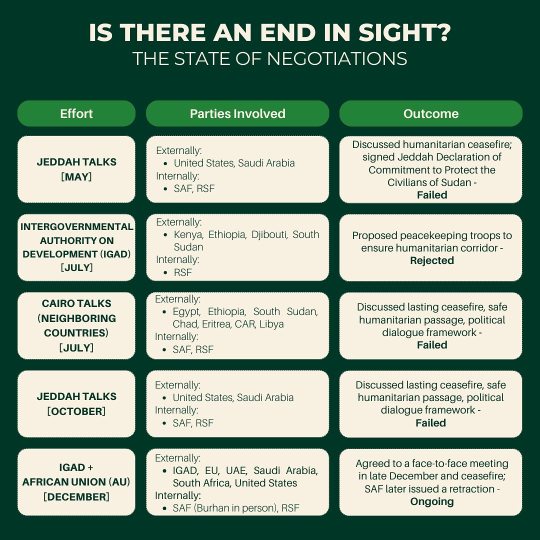
Transcript:
IS THERE AN END IN SIGHT?
THE STATE OF NEGOTIATIONS
Effort: JEDDAH TALKS [MAY]
Parties involved: Externally: United States, Saudi Arabia Internally: SAF, RSF
Outcome: Discussed humanitarian ceasefire; signed Jeddah Declaration of Commitment to Protect the Civilians of Sudan - Failed
Effort: INTERGOVERNMENTAL AUTHORITY ON DEVELOPMENT (IGAD) [JULY]
Parties Involved: Externally: Kenya, Ethiopia, Djibouti, South Sudan Internally: RSF
Outcome: Proposed peacekeeping troops to ensure humanitarian corridor - Rejected
Effort: CAIRO TALKS (NEIGHBORING COUNTRIES) [JULY]
Parties Involved: Externally: Egypt, Ethiopia, South Sudan, Chad, Eritrea, CAR, Libya Internally: SAF, RSF
Outcome: Discussed lasting ceasefire, safe humanitarian passage, political dialogue framework - Failed
Effort: JEDDAH TALKS [OCTOBER]
Parties Involved: Externally: United States, Saudi Arabia Internally: SAF, RSF
Outcome: Discussed lasting ceasefire, safe humanitarian passage, political dialogue framework - Failed
Effort: IGAD + AFRICAN UNION (AU) [DECEMBER]
Parties Involved: Externally: IGAD, EU, UAE, Saudi Arabia, South Africa, United States Internally: SAF (Burhan in person), RSF
Outcome: Agreed to a face-to-face meeting in late December and ceasefire; SAF later issued a retraction - Ongoing
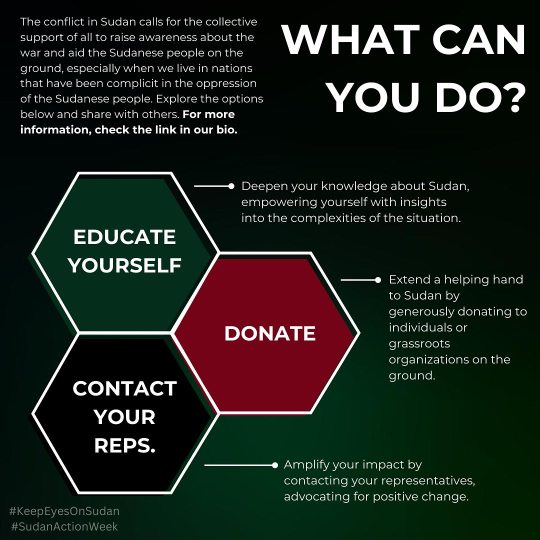
Transcript:
The conflict in Sudan calls for the collective support of all to raise awareness about the war and aid the Sudanese people on the ground, especially when we live in nations that have been complicit in the oppression of the Sudanese people. Explore the options below and share with others. For more information, check the link in our bio.
WHAT CAN YOU DO?
EDUCATE YOURSELF
Deepen your knowledge about Sudan, empowering yourself with insights into the complexities of the situation.
DONATE
Extend a helping hand to Sudan by generously donating to individuals or grassroots organizations on the ground.
CONTACT YOUR REPS.
Amplify your impact by contacting your representatives, advocating for positive change.
#sudan#keep eyes on sudan#KeepEyesOnSudan#Sudan Action Week#SudanActionWeek#i hope the way i formatted it is good#i saw a few hours ago that rsf retreated from wad madani outskirts
367 notes
·
View notes